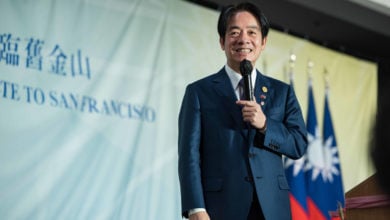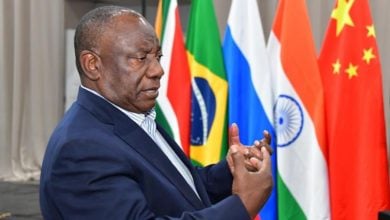Washington announced Oct. 4 a plan to sell $6.5 billion of advanced weapons to Taiwan. The arms deal has been in the works since 2001, and includes advanced missile systems, submarine-launched missiles, surveillance aircraft and Apache attack helicopters. Congress has 30 days to reject the sale, but the plan is expected to pass without serious objection.
The Defense Security and Cooperation Agency says the proposed sales are aimed at improving Taiwan’s defenses and would not alter the basic military balance in the region. However, the Chinese government and people vehemently oppose the plan. Chinese foreign ministry spokesman Liu Jianchao said that passage of the proposal by Congress would harm Sino-U.S. relations, and Chinese Defense Department spokesman Huang Xueping said it would “undoubtedly seriously damage military ties between China and the United States.”
Following the deal’s announcement, China canceled several senior-level visits and other cooperative plans with the United States. In response, U.S. Defense Department spokesman Marine Major Stewart Upton stated: “China’s continued politicization of [the United States’ and Taiwan’s] military relationship results in missed opportunities.” This is a significant spin on reality. In fact, every U.S. military action involving Taiwan has strong political dimensions.
An instrument of counterrevolution
Taiwan, an island situated 75 miles off the southeastern coast of mainland China, has been a part of U.S. imperialist efforts to overthrow the Chinese Revolution since its triumph in 1949. The ruling Kuomitang party, led by Chiang Kai-shek, fled mainland China to Taiwan following the victory of the Red Army. Taiwan was thus poised to become a counterrevolutionary instrument.
For 22 years, Washington recognized the government in Taiwan as the legitimate leader of China. Only in 1971 did the People’s Republic of China replace Taiwan in the United Nations after a majority of member countries demanded it. That year, Washington accepted the authority of the Chinese Communist Party over the whole of China for diplomatic purposes following the CCP’s rapprochement with U.S. imperialism. The U.S. government has recognized Taiwan as a Chinese province since 1979—a posture that allowed the United States to carry on commercial relations with Beijing.
But growing relations with the Chinese government were no substitute for its complete overthrow. To that end, Washington has continued to foster a military relationship with Taiwan. Simply put, it is an arms race, not peace, which is fed by the United States.
The proposed arms deal is clearly shaped by imperialist motives. As presidential candidate John McCain candidly stated, “American interests in Asia are well-served through faithful implementation of the Taiwan Relations Act.”
Washington refers to Taiwan as its “partner” and “ally,” yet these terms are loosely defined. This is apparent in the history of the proposal currently being considered by Congress. When the deal was first proposed in 2001, many in Taiwan resisted. People expressed a desire for public welfare projects, not an arms race. In response, Washington threatened that the island would be viewed as a liability rather than a partner if the package were not approved.
The manifest U.S. pressure drew protests outside the American Institute—the U.S. pseudo-embassy in Taiwan. Demonstrators demanded the United States stay out of Taiwan’s internal affairs.
Washington’s claims of keeping the peace cannot be reconciled with this massive arms deal. The military relationship between the United States and Taiwan is not a “partnership”; it is a tool for the implementation of U.S. imperialist objectives in Asia. Washington fears that China may pose a challenge to its long-term interests in the region. U.S. officials are concerned that China’s growing navy and modernized military will rival Washington’s in the future. The United States wants Taiwan to remain in its sphere of influence to counterbalance China’s growth.
While China has made clear that the arms deal interferes with its internal affairs and national security, Washington continues a massive military build-up and continues to hinder the reunification of Taiwan with mainland China. Washington, not Beijing, is the real aggressor in the region.





